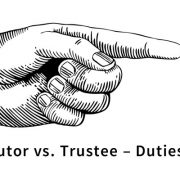Cleveland, Ohio Estate Planning Attorney
Perhaps for most estate planning attorneys, the relationships built among clients can last for decades. Because of the duration of the relationship, it’s not unusual for an estate planning attorney to receive requests for legal assistance from clients who have changed their residence to a state in which the attorney is not licensed. As a Cleveland, Ohio attorney, I’m sometimes asked to prepare estate planning documents for out-of-state residents. Recently, a Cleveland, Ohio friend asked if I would draft a will and power of attorney for his parents who reside in New York. Thus, several questions arose: Can a Cleveland, Ohio attorney draft a will for an out-of-state resident? At what point does an attorney’s assistance cross the line into unauthorized practice of law? Does the client’s change in residence to a state in which the attorney is not licensed require the termination of professional relationship or can it continue in some modified form?
These questions lead to what any knowledge seeker would do: a google search! Not surprisingly, the google search did not provide a concrete answer – and it shouldn’t – so I proposed these questions to several Cleveland attorneys who have been doing estate planning for over 20 years. One attorney said, “Sure, you can draft a will for a non-resident, but just don’t sign your name to it.” Another attorney emphatically said, “No, drafting a will for a non-Ohio resident would be a violation of the Ohio Model Rules of Professional Conduct which prohibits the unauthorized practice of law.” After hearing several conflicting opinions on the matter, I soon realized that this is a common issue, and deciding one way or the other can mean the difference between business as usual, or disbarment.
For the Ohio family estate planner, the main question is whether or not the family estate planner’s practice constitutes the unauthorized practice of law in another state. The test for what constitutes unauthorized practice of law varies from jurisdiction to jurisdiction but most states have adopted model rule 5.5. Unfortunately, no jurisdiction provides a comprehensive definition of practice of law. As a result, the definition of the term “practice of law” is left to the courts to determine. At this point, the federal courts have refused to hold that a state’s prohibition on unauthorized practice of law should apply only to persons who apply the state’s law and not to those who provide legal advice solely concerning federal law. See 1 Family Estate Planning Guide § 19:19 (4th ed.) See also Spanos v. Skouras Theatres Corp., 364 F.2d 161 (2d Cir. 1966). A clear example of this involves an attorney who advertises or implies that he is licensed to practice in that state. See The Florida Bar v. Kaiser, 397 So. 2d 1132 (Fla. 1981). But most attorneys know enough not to promote their practice in a state they aren’t licensed to practice law.
In many instances, it’s easy to discern when an attorney is breaching rule 5.5. In fact, courts have provided several examples of what constitutes the “practice of law” for estate planning lawyers not licensed in the state. For example, giving legal advice concerning the application, preparation, advisability, or quality of any legal instrument or document or forms thereof in connection with the gift of property is the practice of law. See Florida Bar re Advisory Opinion-Non-lawyer Preparation of Living Trusts, 613 So. 2d 426 (Fla., 1993). In another case, an individual gave a client legal advice and practiced law by aiding the client in designating probate and non-probate assets, selecting a form of trust, designating various beneficiaries, and determining tax treatment. The conduct was also considered the practice of law. See Akron Bar Ass‘n v. Miller, 80 Ohio St. 3d 6, 1997-Ohio-364, 684 N.E.2d 288 (Ohio, 1997).
Drafting a will for an out-of-state resident likely falls within one of the examples above, and therefore is unauthorized. However a determination that the requested assistance is the practice of law in a jurisdiction in which the attorney does not hold a license is not dispositive. Ohio rule MR 5.5 lists six exceptions to the general prohibition against the practice of law in a jurisdiction without a license. Of the six exceptions, some allow legal representation in another state on a “temporary basis.” The comment to the rule describes this exception in very broad terms. It includes the following factors for determining whether the representation relates to an attorney’s practice:
1 The lawyer’s client may have been previously represented by the lawyer, or may be resident in or have substantial contacts with the jurisdiction in which the lawyer is admitted.
2 The matter, although involving other jurisdictions, may have a significant connection with that jurisdiction.
3 Significant aspects of the lawyer’s work might be conducted in that jurisdiction or a significant aspect of the matter may involve the law of that jurisdiction.
4 The necessary relationship might arise when the client’s activities or the legal issues involve multiple jurisdictions, such as when the officers of a multinational corporation survey potential business sites and seek the services of their lawyer in assessing the relative merits of each.
5 In addition, the services may draw on the lawyer’s recognized expertise developed through the regular practice of law on behalf of clients in matters involving a particular body of federal, nationally uniform, foreign, or international law. See also MULTIJURISDICTIONAL PRACTICE OF LAW ISSUES IN ESTATE PLANNING, 40 ESTPLN 23, 30, 2013 WL 2407104, 11
The Restatement (third) of Law Governing Lawyers appears to provide even more flexibility. In the estate planning context, for instance, the Restatement includes the following example:
Lawyer is admitted to practice and has an office in Illinois, where Lawyer practices in the area of trusts and estates, an area involving, among other things, both the law of wills, property, taxation, and trusts of a particular state and federal income, estate, and gift tax law. Client A, whom Lawyer has represented in estate-planning matters, has recently moved to Florida and calls Lawyer from there with a request that leads to Lawyer’s preparation of a codicil to A’s will, which Lawyer takes to Florida to obtain the necessary signatures. While there, A introduces Lawyer to B, a friend of A, who, after learning of A’s estate-planning arrangements from A, [asks] Lawyer to prepare a similar estate arrangement for B. Lawyer prepares the necessary documents and conducts legal research in Lawyer’s office in Illinois, frequently conferring by telephone and letter with B in Florida. Lawyer then takes the documents to Florida for execution by B and necessary witnesses. Lawyer’s activities in Florida on behalf of both A and B were permissible. See Restatement (Third) of the Law Governing Lawyers § 3 (2000) § 3 cmt. e
Rule 5.5 and the Restatement may provide latitude for estate planning lawyers to practice law in other states, but drafting a will for a non-resident still appears to be forbidden. Nonetheless, the temporary basis for representation that “arises out of or are reasonably related to the lawyer’s practice in a jurisdiction in which the lawyer is admitted to practice” is an exception that many estate planning lawyers rely on. In fact, much of what estate planning attorneys do may be permissible under this exception. For example, the following may be permissible.
- Preparing state income and estate tax returns for a State A decedent or the trust of a State A decedent for interests with situs in another state or preparing such returns for a State A decedent or the trust of a non-State A decedent with respect to property situs in State A.
- Representing non-State A clients with probate proceedings in a State A court (e.g., probates, guardianships, and trust administrations under the jurisdiction of a State A).
- Providing a client, who resides in State A, or a trustee of a trust, with situs in State A, with general analysis of the laws of another state without making an appearance in a court or consummating a transaction in such state.
Aside from the rules, the practical aspects of drafting a will for an out-of-state resident are not favorable. Each state has their own set of rules with complying with the formalities of executing a will. In Ohio, two signatures are required but in other states, three or more signatures may be required. Thus, even though a client may come to your Ohio office to execute a will, the will may not be acceptable in other states. Many states allow a will drafted in one state to be valid in another; however, the risk of invalidating a will based on improper execution is a risk not worth taking.
In sum, an Ohio attorney should think twice about drafting a will for a client living out-of-state. Even if the client comes to an attorney’s Ohio office, the fact that the client resides in another state raises ethical issues. The unauthorized practice of law is a serious violation of Ohio ethical rules and risks the possibility of disbarment.
The above is not legal advice. Should you need advice on drafting a will, a power of attorney, divorce, or other estate planning matters, call an attorney at Baron Law LLC. Baron Law LLC is a Cleveland, Ohio law firm representing individuals and businesses needing advice on estate planning, divorce, and business law. Call today at 216-276-4282.







